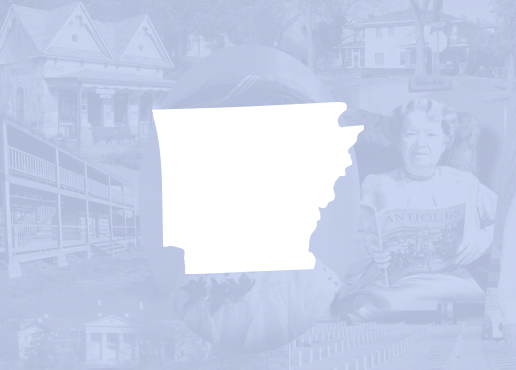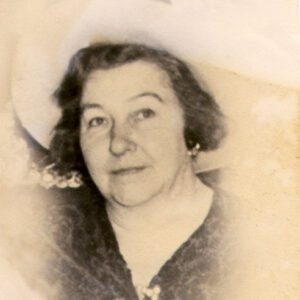calsfoundation@cals.org
Cora Elizabeth Pinkley Call (1892–1966)
Cora Elizabeth Pinkley Call was a popular Ozark writer, naturalist, herbalist, folklorist, and Eureka Springs (Carroll County) historian and booster. A lifetime resident of Carroll County, Call achieved statewide and national prominence as the founder and longtime president of the Ozark Writers-Artists Guild (OWAG), which held annual meetings in Eureka Springs.
Born on April 28, 1892, to George Washington Pinkley and Mary Jane Harp Pinkley in Winona Township, Cora Pinkley was diagnosed with scleroderma (then called “Stone Disease”) at the age of twelve. Her prognosis was eventual paralysis and a short life expectancy. Unable to enjoy a normal childhood or sit still for more than a few minutes, she left school and educated herself through reading and walking in the woods and fields. Known by her friends as “Corey,” she became an authority on the flora and fauna of the Ozarks, subjects she drew upon in her later writings.
Pinkley’s nature walks proved therapeutic. Her health improved, although she had periods of ill health throughout the remainder of her life. A devout Christian, she claimed at times to have been cured by God and the healing waters of Eureka Springs; at other times, she wrote of her lifetime sufferings and handicaps. As a teenager, Pinkley played the organ at meetings at Carrie Nation’s Eureka Springs home, where local women sang temperance and religious songs.
On February 21, 1914, Pinkley married Miles Oliver Call, who worked as a mail carrier in Eureka Springs. Despite doctors’ warnings that her health problems would prevent her from bearing children, the couple had five. The Calls lived on forty acres near the Kings River.
From an early age, Call had a passionate ambition to be a writer. She gave away her early articles but eventually began selling them to newspapers and magazines. Call wrote poetry, short stories for children and adults, magazine and newspaper articles, and both fiction and nonfiction books, which were mostly self-published and self-marketed. She sold many of her books for $1.00 through the mail. In 1953, she and Edith Bestard co-founded Ozark Gardens, a nationally distributed newspaper containing gardening information and nature stories.
Call’s writings, both fiction and nonfiction, focused on the themes of traditional family values, religion, patriotism, temperance, self-reliance, and the beauty of nature and its ability to transform the human spirit. These themes reflected the era in which she lived; her Ozark upbringing; and the influences of the Great Depression, the temperance movement, the Cold War, the McCarthy era, religious conservatism, and the fierce independence of the Ozark people. She worked as a reporter and columnist for a number of newspapers and news syndicates. When she felt well, she went on assignments; when she felt ill, she wrote mostly fiction, sometimes in serial format.
Her first book, Pioneer Tales of Eureka Springs and Carroll County (1930), recounted tales from Call’s ancestors plus profiles of Eureka Springs’ founding fathers, descriptions of early businesses, and Call’s “preachment” against the evils of divorce and the modern “pursuit of pleasure.” Both Shifting Sands (1943) and The Dream Garden (1944) began as serialized children’s fiction and were later published as books. Shifting Sands, likely based on travels Cora and Miles made to the West seeking relief for Miles’s tuberculosis, told the story of a brother and sister traveling to western climes in order to help the brother regain his health. In The Dream Garden, city-bred twin sisters find fulfillment in their new Ozark home. Within My Ozark Valley (1956) described Call’s pioneer ancestors’ experiences homesteading the Kings River valley.
Call’s writing had a folksy style. Her non-fiction book Eureka Springs, Stair-Step-Town (1952) included a history of Eureka Springs, plus chapters on folkways, nature, religion, patriotism, and her anger over outsiders’ depictions and stereotypes of Ozark hill people. For God and Country (1962) was an anti-communist tract written to “give God his rightful place in the U.S.” Ozark recipes were featured in From My Ozark Cupboard (1950), which covered standard fare as well as instructions for killing hogs; making head cheese and squirrel stew; and cooking raccoons, groundhogs, and opossums. Call’s other books included the nonfiction True Stories of Birds and Animals (1960) and Trailblazers of the Ozarks (1974), a fictionalized tale based on her ancestors’ experiences.
Call formed the Ozark Writers-Artists Guild in 1935 to give creative people a time and place to exchange ideas. The original group included Call, Lida Wilson Pyles, Ted Richmond, Ida Wilhelm, Nellie Mills, Olive Ellis, and Audrey Milum. Bonnie Lela Crump and Otto Ernest Rayburn were also involved with OWAG, which grew into a nationally known group. Call curtailed her involvement with the OWAG in the 1960s due to failing health, and the organization disbanded shortly afterward.
Call died on June 7, 1966, and is buried in the Independent Order of Odd Fellows cemetery in Eureka Springs. During her writing career, her husband had built a cabin on their property near Eureka Springs where she practiced her craft. The cabin now stands on the grounds of the Eureka Springs Historical Museum.
For additional information:
Brewer, Jeaneice. “Twentieth-Century Arkansas Writers.” MLS thesis, University of Mississippi, 1957.
Cora Pinkley Call Papers, 1885–1977. Special Collections. University of Arkansas Libraries, Fayetteville, Arkansas.
Cora Pinkley Call Papers Addendum, 1930–1966. Special Collections. University of Arkansas Libraries, Fayetteville, Arkansas.
Diane F. Worrell
University of Arkansas Libraries
 Carroll County Historical and Genealogical Society
Carroll County Historical and Genealogical Society Literature and Authors
Literature and Authors Cora Call
Cora Call 




Comments
No comments on this entry yet.